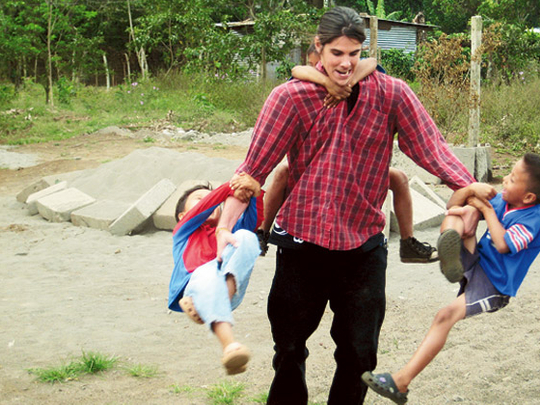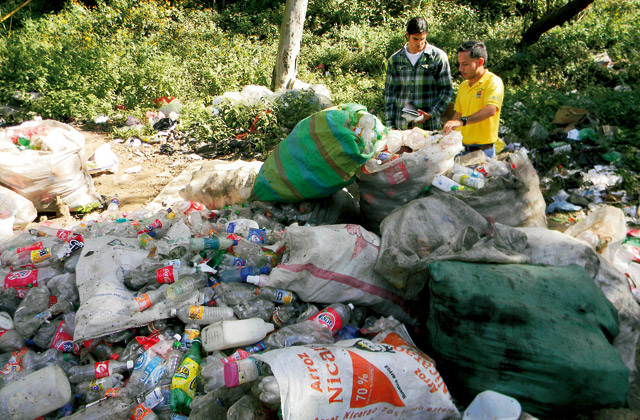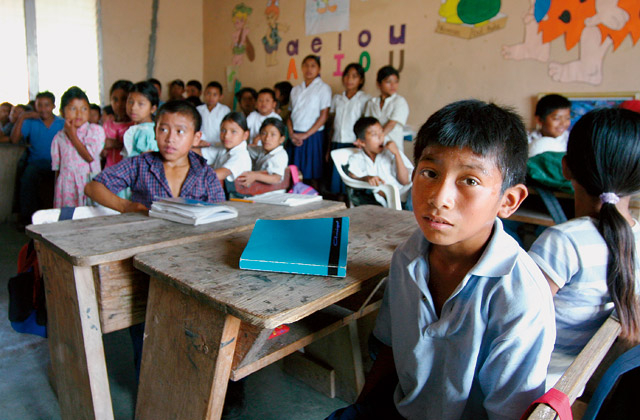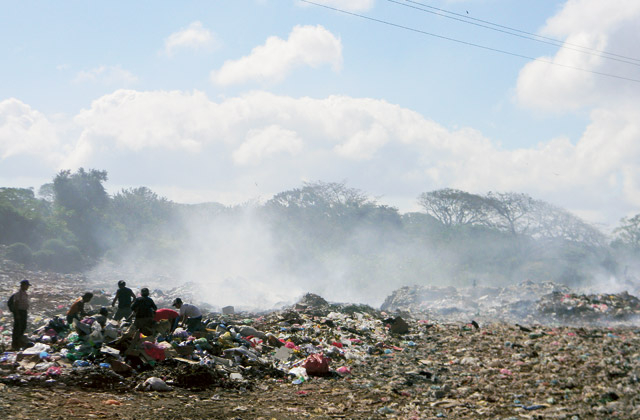
In many ways, Andrew Craig is an ecological pioneer. Working in the Central American country of Nicaragua, he is busy on a project that will help reduce and recycle waste, which if left unmanaged will destroy portions of the country's beautiful jungle and rainforest.
"The situation with toxics is at a critical stage," says the 25-year-old Californian, who is keen to prevent rubbish from becoming a potential ecological catastrophe.
The idea to do something about the garbage in Nicaragua took shape when Craig was majoring in city and regional planning at California Polytechnic State University, San Luis Obispo in the United States.
It was there he became friends with Bert Muhly, who is involved with the Sister Cities programme in Santa Cruz. Sister Cities is a non-profit body created to promote international ties and understanding, and Muhly invited Craig to join them, certain he would be an asset to the organisation.
Together with Three Americas, another non-profit organisation championing economic and social justice, the bodies assigned Craig to go to Santa Cruz's sister city of Jinotepe, in Nicaragua. There, Craig was to shadow Hector Perla, a University of California-Santa Cruz professor of Latin American Studies, as he interviewed locals to see how the economically beleaguered country could be helped.
"It was the opportunity of a lifetime," says Craig, in an email interview with Friday. "During the trip late last year [sponsored by Three Americas Incorporated] I learnt as much about the Nicaraguan people and culture as I could."
Santa Cruz has a long-standing relationship with Jinotepe. It has donated primary garbage trucks as well as funded numerous community improvement efforts.
"Prof Hector and I were linked directly to the municipal government of Jinotepe as well as the National University located in Jinotepe, Unan," says Craig.
Jinotepe has a population of around 45,000 and is the capital of Carazo, which is located south of Managua, the capital of Nicaragua. The area is known for its long history of coffee cultivation. Poverty is rife and health care inadequate, but one of the most serious problems facing the people and the city was poor waste disposal techniques.
"While the trip helped me improve my Spanish I also learnt a lot about the people, culture and community of Jinotepe and furthered my knowledge of waste management efforts being conducted within Nicaragua and the Third World in general."
Craig found the locals had no waste recycling programmes. "So I formulated a recycling action plan. The people there were being inundated with plastic objects. Refuse and garbage were thrown anywhere."
Ironically, the only residents who were recycling were scavengers picking through open landfills for anything that could be used or sold. "Plastic is being burned in the landfills, but there is also medical refuse, chemical waste, dead animal parts. Your imagination is the limit," Craig says. The scavengers take an average 1,916kg of refuse to processing facilities in the capital city and earn about $437 (Dh1,605). Divided by 26 people, that comes to $17 per person per week.
"My greatest fear was if we set up a recycling programme, what would happen to these people and their livelihood?" Craig says. "I knew they had to be included in any plan."
Working with the municipal government and National University of Jinotepe, Craig set up a pilot recycling plan, beginning with educating the young. "It's a simple concept to put a wooden frame collection bag at each school with a recycle logo on it," he says. "That's what we're doing. We will include businesses, putting collections bins in stores."
Part of the project also entails the creation of an educational pilot developed with university students in Jinotepe. "The pilot will seek to educate students at the primary and secondary level regarding the natural environment and the importance proper waste management plays in its preservation and specifically to convey proper recycling methods."
Following the implementation of the education process within each school, recycling centres will be provided to allow the opportunity for education to be put into action. After the accomplishment of recycling centres within local schools, local business support will be sought and recycling centres set up.
"The programme is in the initial stage. The plan details have been prepared and the materials to be used have been identified.''
Craig also established cooperative working relationships with the National Recycling Forum of Nicaragua. Avina, a Latin American organisation that promotes sustainable development, will help scavenger groups to be included in solid waste management plans with possible employment, financial assistance and education, Craig says.
He returned to Jinotepe for two months earlier this year. "My recent trip was to enhance the plan within the community as well as to seek out influential bodies currently conducting recycling work within the country. I've learnt an incredible amount along the way. It has helped me plan better. Identifying low-hanging fruit as well as the major hurdles has been and will continue to be relevant, I believe, throughout the entire process."
Though the programme remains in its infancy, Craig plans to mount a recycling campaign in the Nicaraguan media and via flyers, and is trying to raise money and volunteers. He aims to return to Nicaragua in August.
Funding has been a major issue. "At this point, the only financial aid received has come from Three Americas; however, assistance from other groups within Nicaragua has been solidified for the future as well as the prospective financial aid from donations in California. The goal at this point is to raise as much funding as possible for return implementation.
"Mechanisms of fund-raising include the sale of shirts as we have kicked off a clothing company aimed specifically at raising money and awareness called Ranawear. We also sell fairly traded, shade grown, organic Nicaraguan coffee and are seeking donations as well as grant opportunities."
So how smooth does he think the road ahead is? "Environmental education processes have failed in the past in Nicaragua due to a lack of continuity within the education process; programmes are initiated and then seem to lose steam with a lack of continued support.
"A university would be ideal in retaining continuity and I am attempting to establish this with my former university. A body such as Cal Poly would provide the means to send willing volunteers down to Nicaragua to continue and enhance the education process and the recycling plan within Jinotepe year after year.''
Residents of Jinotepe took Craig into their homes during his visits. "The project and - more importantly - the people, have changed my thinking and have influenced my life in amazing ways."
With any life-changing experience, the return to your past position is not easy. The difficulty lies in maintaining the same energy levels and motivation.
"This has been a life-altering experience for me," he says. "The hardest part is figuring out what happens next in the programme and getting people to follow through. But the Nicaraguan people have been wonderful. They're like family.
"The culture and the people are among the most vibrant and fascinating I have ever encountered. To be a part of a people who hold community, family and culture above all else has been a true blessing and inspiration in my life, one in which has changed my way of thinking,'' he says.
Craig, who enjoys backpacking, rock-climbing, slack-lining, sailing, and snowboarding, says that nature has been an influential force in his life. "It is fun to be part of her introduction to the great outdoors. My love of nature has contributed to make me determined to preserve and enhance the quality of the natural environment."
"Emotionally, my experiences have been uplifting and depressing, draining and energising all at once…I have felt overwhelmed more than a few times and seem to always find the courage and support needed to drive forward with the project.
So what's Craig's philosophy on life? "I believe this world should be enjoyed to the fullest and it is important to assist those around us with this pursuit. We have one shot at this life; I don't want to look back at mine with regret."
Inside Info
For more information about the project, go to www.reciclojinotepe.com
Making a difference
- Who: Andrew Craig
- What: Pilot recycling programme
- Where: Jinotepe, Nicaragua
Facts:
- Americans use around one billion carrier bags annually, creating 300,000 tonnes of and fill waste. (Info courtesy: http://www.cleanair.org/Waste/wasteFacts.html)
- US documentary photographer Jon Goering has launched Kickstarter, a project "to document lives of families living at the dump…" (Info courtesy: http://bit.ly/aBybLY)














